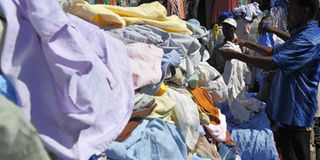How the economy gets back to its feet depends on our seriousness

A man samples second-hand clothes at the Gikomba open-air market in Nairobi. PHOTO | FILE | AFP
What you need to know:
- Whether we are successful or not will depend on how the various sectors, sub-sectors and drivers of the economy take up the challenge.
- Our underperforming agriculture sub-sectors such as rice, sugar, wheat and maize should be employing many more as well as helping the country be a little more food-sufficient.
Controlling and containing Covid-19 is a work in progress. The jury is still out but there are tentative signs and hopes that steady progress is being made and we can start to take a peek at what life after the pandemic will entail.
The latter is when the really tough work begins. I am not belittling the pandemic per se and the medical challenges it has posed. What I am directly referring to is the massive economic, social and possible political sea change that is taking place and which will continue for many months.
It is important to be crystal clear on this: The pandemic has massively disrupted economies and society at large. That was bad enough. Then the assortment of containment measures literally brought much commercial activity and literally many economies to a virtual standstill or a snail’s pace.
MASSIVE REPAIR
The cynics often said the cure was worse than the virus itself. That has an element of validity but then the health and medical fallout could have been much greater without the measures.
That said, we now come to the long haul. Three things need to borne in mind. First, many in society have been ravaged in one way or another, and so there is massive repair work to be undertaken.
Secondly, there has been an irrevocable change around the world. The exuberance, fizz and extravagance of the past has largely been squeezed out. Many of us have been subjected to daily haircuts as we are forced to consolidate and downsize and a few days later repeat it.
Thirdly, and most importantly, this is not about government reviving the economy. The economy is us — you and me — and we are, indeed, the engine. Whether we are successful or not will depend on how the various sectors, sub-sectors and drivers of the economy take up the challenge.
The government is a player but in a facilitating way. It can only help us motor our way back with some measures and incentives. The challenge is how the various drivers of that motor take up the challenge and how fast they can do it.
One overwhelming and brutal fact that will come home quickly is that nothing will be the same again. It will not be a case of business resuming where it stopped off. For our products, all will have to be evaluated and re-synchronised to the changing market conditions.
TOURISM
Take tourism, for example. All our markets have taken a big hit from Covid-19. Their economies and earning power have shrunk. Yet the yearning to travel will be sharper than before.
But the first hitch is that flying is going to become a costlier affair if some semblance of social distancing is enforced. Indeed, flying may be totally out of the question for the majority in the foreseeable future. The legendary ‘Oracle of Omaha’, Warren Buffett, appears to think so: He has disinvested from the American airline industry.
Apart from a privileged few overseas clients, our tourism industry is going to have to look elsewhere — which is the domestic and, possibly, regional market. But hold on: Our tourism industry has not been serious about the likes of much of middle-class Kenya because even their ‘resident rates’ tend to be a bad joke and on the higher side of affordability. That is why so many of us are economical and choosy when considering our many wonderful domestic destinations.
The industry is going to have to seriously court the domestic punters, and that means offering rates that are affordable to us and giving us value for money.
There is another factor. In order to survive, hotels and transport services such as airlines will have to reduce prices significantly or literally drop out of the market. The same adjusting will have to be carried out by all sectors and sub-sectors of the economy.
Our underperforming agriculture sub-sectors such as rice, sugar, wheat and maize should be employing many more as well as helping the country be a little more food-sufficient.
Last but not least, we have hardly scratched the surface of how we get this economy back on its feet. A few tax concessions here and there is just a very modest start.
Mr Shaw is a public policy and economic analyst. [email protected].





